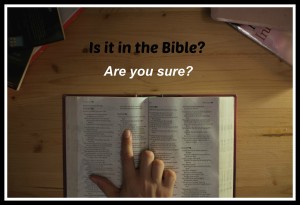Is It In The Bible?
I grew up hearing adults say all kinds of wise things. Just the sort of statements God would include in the Bible, especially in the book of Proverbs.
You’re probably familiar with most of them. So how about a little quiz? How many of the following axioms are actually in the Bible?
- Cleanliness is next to godliness.
- Laughter is the best medicine.
- God helps those who help themselves.
- Spare the rod, spoil the child.
- God moves in mysterious ways, His wonders to perform.
- Pride goeth before a fall.
- The eye is the window of the soul.
- Money is the root of all evil.
- To thine own self be true.
 Cleanliness is next to godliness.
Cleanliness is next to godliness.
In 1605, Francis Bacon wrote, “Cleanness of body was ever deemed to proceed from a due reverence to God.” In 1791, John Wesley said, “Slovenliness is no part of religion. Cleanliness is indeed next to Godliness.”
The closest Bible verse is James 4:8 (ESV) – “Draw near to God, and he will draw near to you. Cleanse your hands, you sinners, and purify your hearts, you double-minded.”
Laughter is the best medicine.
You may have read this feature in a monthly issue of Reader’s Digest, but you didn’t see it in the Bible. The closest verse is Proverbs 17:22 (NIV) – “A cheerful heart is good medicine, but a crushed spirit dries up the bones.”
God helps those who help themselves.
This adage is often attributed to Benjamin Franklin, but its essence actually appeared much earlier. In 409 BC, Sophocles wrote, “Heaven ne’er helps the men who will not act.” A similar statement is found in the Qu’ran: “Verily never will God change the condition of a people until they change it themselves” (13:11).
Spare the rod, spoil the child.
This axiom is from Samuel Butler, a 17th century British poet. Is it in the Bible? Not as a direct quote. The closest Bible verse is Proverbs 13:24 (NIV) – “Whoever spares the rod hates their children, but the one who loves their children is careful to discipline them.”
God moves in mysterious ways, His wonders to perform.
This statement may be true, but you won’t find it in Scripture. It appeared in a hymn written by 19th century poet William Cowper: “God moves in a mysterious way, His wonders to perform.” Isaiah 55:8 (NIV) comes closest – “‘For my thoughts are not your thoughts, neither are your ways my ways,’ declares the LORD.”
Pride goeth before a fall.
This adage comes close to a Bible verse, although it’s also not a direct quote:
Proverbs 16:18 (ESV) – “Pride goes before destruction, and a haughty spirit before a fall.”
The eye is the window of the soul.
Another phrase that sounds like it should be in the Bible, but it’s not. A related verse is Matthew 6:22 (ESV) – “The eye is the lamp of the body. So, if your eye is healthy, your whole body will be full of light.”
Money is the root of all evil.
This is another maxim that is very similar to a Bible verse, but it’s missing a few key words. First Timothy 6:10 (ESV) says, “For the love of money is a root of all kinds of evils.”
To thine own self be true.
Is it in the Bible? No. It’s a line from Hamlet, written by William Shakespeare: “This above all things: to thine own self be true” (3.1.81).
So how many of these nine axioms are quoted from the Bible? One? Two? Five?
None!
Now it’s your turn. What biblical-sounding axioms can you add to this list…and do you know if they really are in the Bible?

Love this, Ava!
How about this one: “God won’t give you more than you can handle.”
I often hear Christians say this but it is not in the Bible!
So true, Crystal! God often gives us more than we can handle on our own so that we would depend on Him!